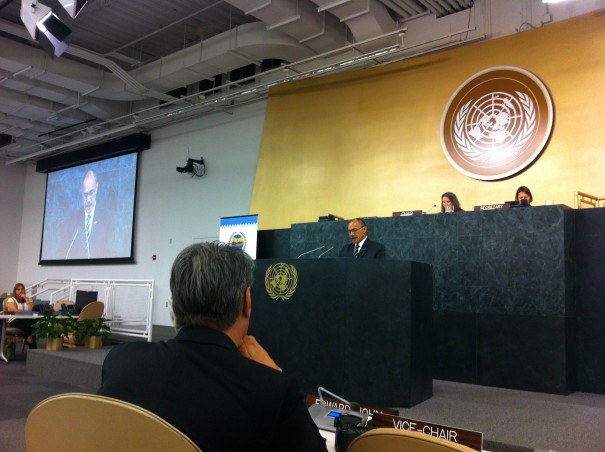The Opening Ceremony of the Permanent Forum

Rau rangatira ma, nga mihi māhana ki a koutou – Distinguished leaders, warm greetings to you all.
Mr Chair,
It is a great honour to have this opportunity to present New Zealand’s opening statement at the Thirteenth Session of the United Nations Permanent Forum on Indigenous Issues.
Firstly, I acknowledge the indigenous peoples of this place, the Onondaga, ka nui te mihi ki a koutou e te mana whenua o tēnei wāhi.
I also greet all indigenous peoples, as well as the nations and their representatives who have gathered here for this session.
New Zealand reaffirms our support for the Declaration on the Rights of Indigenous Peoples.
As the Hon Dr Pita Sharples stated in formalising New Zealand’s support in 2010– “The Declaration contains principles that are consistent with the duties and principles inherent in the Treaty of Waitangi, one of our nation’s founding documents, such as operating in the spirit of partnership and mutual respect.”
It encapsulates aspirations that underpin the New Zealand Government’s relationships with Māori as the tangata whenua – the indigenous Peoples - of Aotearoa New Zealand.
The New Zealand Government remains committed to building and maintaining meaningful relationships with Māori, and to empowering Māori to be actively involved in achieving better results. New Zealand cannot reach its full potential unless Māori are empowered to achieve their aspirations and their potential.
Over the past year, New Zealand has continued to take steps towards improving outcomes for Māori.
Significant progress is being made settling historic Treaty of Waitangi Claims, with a number of settlements completing the final stages and legislation being enacted. Other claimants have reached agreement with the Crown on settlements, and final legislation to enact these settlements is being prepared. A mandate for the largest remaining iwi (Tribe), Nga Puhi has also been recognised, allowing them to progress to the next stage of negotiations with the Crown.
The conclusion of each Treaty Settlement provides a stronger cultural, social and economic base for each tribe, and for Māori overall.
The Māori economy continues to grow and the Crown is supporting Māori led, government enabled economic development through He kai kei aku ringa (which literally means to provide the food you need with your own hands) – the Crown Māori Economic Growth Partnership.
An Independent Constitutional Advisory Panel completed its consideration of New Zealand’s constitutional arrangements, including considering the place of the Treaty of Waitangi in current and future constitutional arrangements and the appropriate representation of Māori. The New Zealand Government is currently considering the Panel’s report.
The Government has also received the report from an independent review panel appointed to investigate the legislation regulating Māori land, the Te Ture Whenua Māori Act, and is developing legislative amendments based on the Panel’s recommendations. These amendments will empower Māori land owners to utilise their land more effectively and with less unnecessary Crown oversight.
While New Zealand continues to make progress, more can be done. Sadly, Māori continue to be over-represented in the criminal justice system, Māori have on average the poorest health status of any ethnic group in New Zealand, Māori unemployment is still significantly higher than the New Zealand average, and despite positive progress Māori children, especially boys, continue to under-perform their non-Māori classmates in school.
These issues continue to be significant and systemic. Nevertheless, the Government is continuing to work with local communities and Māori to identify long term sustainable solutions.
Finally, I wish to acknowledge the commitment of indigenous peoples to continue engaging in positive dialogue in the lead up to the World Conference in September.
While this has been a challenging period for all involved, I know we are all committed to achieving a constructive and participatory Conference which addresses the pressing issues we all face.
Indigenous Peoples have contributed an immeasurable effort to both the United Nations organisation and to their own communities and lands. I encourage all indigenous peoples, their advocates and all nation states to maintain an open dialogue, to continue seeking enduring solutions to the many challenges we all face, and to take opportunities to realise indigenous peoples’ potential and aspirations for the future.
Na reira, tēnā koutou, tēnā koutou, tēnā rā koutou katoa!
